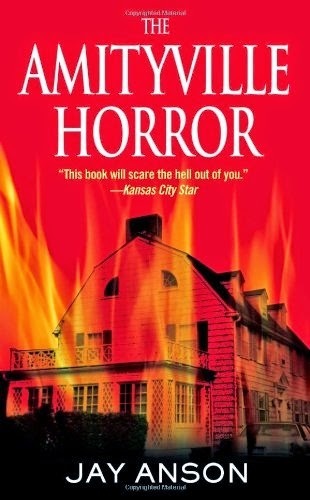The Amityville Horror: If It Isn't a True Story...
 As you might know, I don't believe in ghosts. I'm willing to give real life ghost stories the benefit of the doubt, though, and since I do believe in the Devil/demons, I can believe The Amityville Horror is a true account.
As you might know, I don't believe in ghosts. I'm willing to give real life ghost stories the benefit of the doubt, though, and since I do believe in the Devil/demons, I can believe The Amityville Horror is a true account.That poses a problem. I can't review a documentary-style book in the same way I would a fiction story. I can't fault the author's characterization or the consistency of the plot. Now, there is some controversy about whether or not these things really happened. I didn't do extensive research, but Wikipedia lists several criticisms, including outright claims that it's a fictional story.
In fact, I learned in my class that the Lutz family even admitted it was a hoax once.
Still, it presents itself as a true story, so as I read it, I tried to view it as if it was one.
My feelings toward this book would be much less positive if I didn't go into it with that attitude. I never really grew attached to any of the characters or got a good sense of characterization, and I didn't feel a sense of immediacy about the plot. Rather than experiencing the story (as you do with a good book), I felt like the story was being told to me. That all ties in to the lack of horror I felt while reading it. Although reviews described The Amityville Horror as terrifying, the fear seems to hinge on your belief that these things actually happened. It's scary to think that such things are real and could happen to anyone--even you. As a story, however, it failed to scare me.
Books can be terrifying, but only if they pull you in. My lack of investment in the characters and plot left me with no dread or tension.
More than anything, the scares irritated me because of how the author handled them--exclamation points. Lots and lots of exclamation points. Now, I like the occasional exclamation point here or there, but it just tied in to my feeling that I was supposed to be scared merely because the events were real. Even if this was an account of true events, I wish the author would have put a little more care into each horrific revelation.
Still, there's a positive side to everything. This book was the proof I needed that littering my passages with exclamation points really is a bad idea. H. P. Lovecraft can get away with it, as his characters frantically scrawl down their final terrified thoughts while dying, but it doesn't work for everyone.
I'd love to critique its plot, but again, I'm limited because of its nature. I wanted to know what forces were at work in the house. I wanted to learn the dark details of the secret room and what it was once used for in the past. I wanted to understand why the various supernatural events were all so random, since the events felt more like a collection of spooky encounters rather than a cohesive story. If it's a true story, though, my objections fly out the window. Why did these things happen? Because that's how they happened. Why don't we get more details? Because the other details aren't known.
Of course, if it's a hoax... I could give them the benefit of the doubt and say that a believable hoax can't be wrapped up as neatly as a fictional story, but still, I can't help but wonder if they just plotted out their hoax badly, or didn't care enough to pay attention to the details.
With all that said, what's up with the cliffhanger ending? I like it... from the perspective of a fictional story. From the documentary perspective, were we supposed to believe the Lutzes really were haunted after they left the house, or did the author just think it would be a cool twist?
I feel like my thoughts on The Amityville Horror are scattered and rambling, and that's because I really didn't feel anything for this book at all. At least I hated Ghost Story , at least I could pin down my issues with The Others ...
I left The Amityville Horror feeling apathetic. It wasn't very good, it wasn't very bad, and I could cut it some slack if it was real, but if it's a hoax, I wish it had been at least a better story.
Published on November 05, 2014 09:00
No comments have been added yet.



